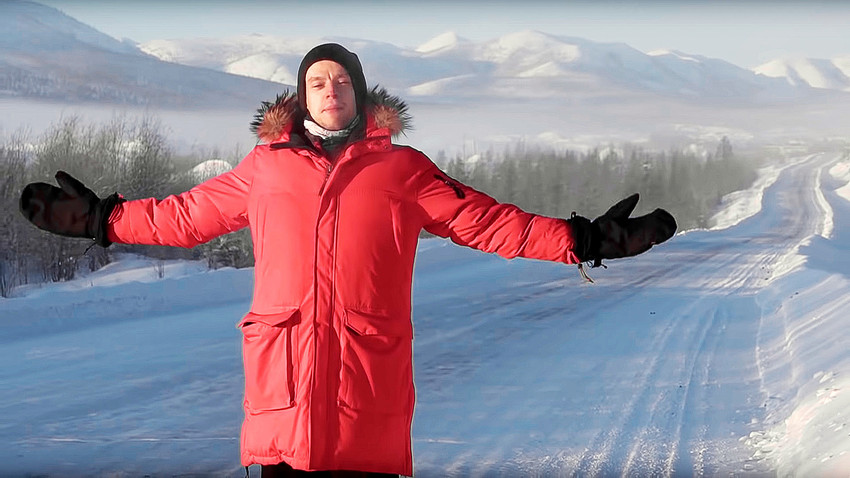
One of Russia’s most popular video bloggers and journalists, Yuriy Dud, gained national fame after launching his YouTube channel where he talks to famous Russians from all walks of life. To diversify the content, he also shoots documentaries.
For his ‘Kolyma’ film, which already has 17 million views, Dud drove along the Kolyma highway in the country’s Far East, and which was built by victims of Stalinist repressions. Dud talked with local residents and eyewitnesses of the epoch, such as Natalia Korolyova, the daughter of the famous rocket scientist, Sergey Korolyov, who spent part of his jail sentence in a Kolyma labor camp.
The reason for choosing this topic? To educate the country’s youth. According to Dud, almost half of Russians aged 18-24 have never heard of Stalin’s repressions.
Leonid Parfenov, a legendary TV journalist of the 1990s, followed the latest social media trend by launching his own YouTube channel, Parthenon.
‘The Russian Jews’ saga on his channel consists of three films and is literally dedicated to the history of Jews in Russia before and after the 1917 revolution, as well as during Soviet times.
Dikson is the world’s most northern urban settlement. During the 1980s more than 5,000 people lived there. Today, there are only 300 people residents amid a vast empty territory of 220,000 square kilometers. The polar night here lasts for many months.
The film focuses on people who continue to live in such tough conditions.
This legendary documentary about Russian rock was filmed over the course of five years, and it tells the story of the new generation of Ural region rock musicians who face extreme challenges while pursuing their career. Ultimately, they have to decide whether to quit and walk away, or struggle forward.
In this series of seven documentaries, Russian journalist Anton Loshak analyses the history of the Russian Internet and how it has changed over more than twenty years.
The series is dedicated to the transformation of the Russian Internet from modest attempts to establish the first ever network, such as when holding the first Soviet-era TV bridge with the U.S., to the creation of Vkontakte, the country’s most popular social network, as well as the founding of Telegram, the messaging system that is used around the world.
This documentary series tells the story of 20 people born in 1983 in the former USSR. The four episodes show all the characters at a particular age: 7, 14, 21 and 28.
The film is a Russian-British co-project that shares its concept with the British project, ‘Up’. Out of more than 600 hours of footage, only 10-15 minutes make it to the final cut for each character. The fifth film is currently being produced and is set to be released later this year.
This film is dedicated to the beauty of the Russian North, its unique wooden architecture and the people who devoted their lives to its preservation.
The film’s creators are sure that the Russian North is a unique and underestimated part of Russian heritage, but some of its rural architecture and traditions, unfortunately, totter on the brink of destruction. Now, the defining features of this region, including wooden architecture, rural community lifestyle and religion, face the seemingly unstoppable forces of globalization, which some of the locals are struggling to stop.
In 2014, the RT TV channel won the prestigious Gold Award at the New York Festivals Television and Film Awards, beating CNN in the documentary category with its film, ‘Blood and honor,’ which is about the custom of ‘blood feud’ in the Caucasus region.
The blood feud not only defends a family’s honor and clan, but it also helps to protect society from criminals. According to the tradition, blood can be shed only in response to a murder, if there’s no forgiveness. The film explains how some people in the Caucasus become “blood enemies” and what this means for them.
One of the most prominent Russian documentary film directors, and an ‘Emmy’ award winner, Sergey Miroshnichenko made a film about the Winter Olympic Games in Sochi in 2014, which was a very important event for Russia and the whole world.
This powerful and touching story is about the source of strength and inspiration for athletes taking part in the world’s most important sporting events: showing their hopes, fears, dreams and sharing their life stories that brought them to this great moment. The director analyses what it takes to create an Olympic character, and to develop personal stamina and inner strength.
This series of four documentaries (one part for each season of the year) depicts the life of people living in Bakhta, a settlement in the Krasnoyarsk Region situated on the Yenisei River.
The author and director, Dmitry Vasyukov, lived there the entire year to understand and show the locals’ circle of life, which very much depends on natural and weather conditions.
If using any of Russia Beyond's content, partly or in full, always provide an active hyperlink to the original material.
Subscribe
to our newsletter!
Get the week's best stories straight to your inbox